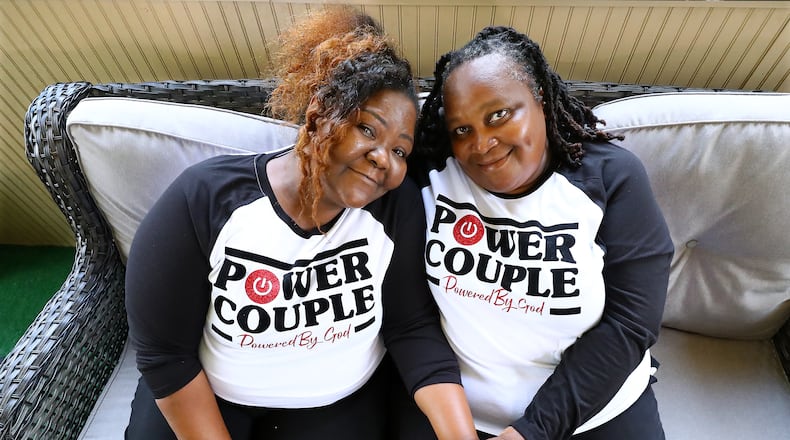The day after the U.S. Supreme Court delivered the ruling that overturned Roe v. Wade, the phone calls started rolling in to the Rev. Sonya Williams.
The court had just stripped away the federal guarantee of abortion rights, leaving it up to individual states to decide whether the procedure would be restricted or banned. But there was another issue that also had the callers unnerved.
In a concurring opinion that accompanied the ruling, Justice Clarence Thomas encouraged his colleagues to not stop there. Other landmark Supreme Court decisions — among them, the ones that legalized same-sex marriage and same-sex sexual activity — need to be revisited, he wrote.
Thomas argued that the legal rationale used to overturn Roe — that abortion rights are not protected by the 14th Amendment’s due process clause — should be applied in those cases.
Though none of the other justices signed on to the opinion, it left LGBTQ communities in Georgia and across the nation rattled. They fear Thomas’ opinion is a harbinger of things to come.
”People are nervous and on edge,” said Williams, who pastors Real Inspiration Ministries in Atlanta and has been in a same-sex marriage since 2015. “We’ve had our rights snatched away so many times that we have no faith that there will not be an attack on the LGBTQ community.”
Already, conservative state legislatures throughout the country have advanced bills that “target transgender people, limit local protections and allow the use of religion to discriminate,” according to the ACLU.
Many worry that, sooner or later, a legal challenge to same-sex marriage will wind its way back to the Supreme Court.
Williams’ anxious callers were gay and lesbian couples who plan to marry. They wanted to know if they should say their “I dos” even earlier, said Williams.
Credit: Contributed
Credit: Contributed
Worries about a domino effect
Many advocates and legal experts say there’s no need to rush to the altar.
While those critical of the Supreme Court ruling say there’s now a real threat to same-sex marriage, and other rights not explicitly guaranteed in the Constitution, some of the court’s conservative justices sought to alleviate those concerns. Justice Samuel Alito, who wrote the decision that reversed Roe, addressed it directly, saying that the same reasoning used in the abortion case doesn’t necessarily apply to same-sex marriage laws.
But the court’s liberal justices also see a threat.
“No one should be confident that this majority is done with its work,” they said in their dissenting opinion. The right to same-sex intimacy and marriage “are all part of the same constitutional fabric, protecting autonomous decisionmaking over the most personal of life decisions.”
Cathryn Oakley, state legislative director and senior counsel at the Human Rights Campaign, understands that worry.
“The movement to harm LGBTQ people and the movement to take away access to abortion are unfortunately very linked,” she said.
The fall of Roe could potentially set off a domino effect, Oakley said. But she doesn’t think it will end with same-sex marriages becoming illegal again.
“Public opinion continues to be very much in support of marriage equality, so I do not believe that marriage equality is truly, ultimately going to be at risk. " Oakley said. “But that doesn’t mean that we won’t see attacks on marriage by state legislatures.”
Timothy Head, executive director of the Faith & Freedom Coalition, said the court’s majority made it clear that the opinion affected only abortion.
He agrees that the debate about abortion — and other issues — belongs at the state level.
“Until recently, legal questions of marriage had been determined on a state-by-state basis,” he said. “As is the case with most social issues, these questions are best debated and determined by officials elected by the people in states across the country.”
Among U.S. metropolitan areas, Atlanta has the ninth largest population of LGBTQ people, with about 194,000, according to a 2021 survey from the UCLA School of Law’s Williams Institute, a think-tank that conducts independent research on sexual orientation and gender identity law and public policy.
But the state has been slow to warm to the idea of same-sex marriages.
Roughly 75% of voters approved a state constitutional ban in Georgia in a 2004 referendum. It’s one of 35 states that had made such unions illegal before a 2015 Supreme Court decision, in Obergefell v. Hodges, made those laws invalid, according to Pew.
Nine years after Georgia’s referendum, in 2013, less than 50% of voters surveyed in an Atlanta Journal-Constitution poll said they supported gay marriage.
By removing the barriers to same-sex marriage, the Supreme Court decision allowed gay and lesbians couples to take advantage of the same tangible benefits as other married couples — such as filing joint tax returns, making emergency medical decisions and adopting children.
But many remember the old days all too well.
A ‘combination of terror and anger’
Davean Williams and Christina Repici lived in Tucker before the Obergefell v. Hodges decision. In 2014, they had to travel to Washington, D.C., where same-sex marriage was legal, to tie the knot.
They didn’t want to settle for a commitment ceremony, which would not have been legally binding. They wanted it to be official.
“We wanted to legitimize our relationship, and I didn’t want to do it somewhere where it wasn’t real,” said Williams, who’s not related to Rev. Williams.
Reality hit when they returned to Georgia. Being legally married was one thing. Acceptance was another.
The couple went to the credit union to open a joint account. They were helped by a young employee. A joyful Repici mentioned that they had just been married.
“He didn’t say anything,” she recalled. “No congratulations. Nothing. I said, ‘Hmmm, if we were a straight couple, you would be congratulating us right now. That’s interesting.’ I can still picture his face.”
The two now live in Tampa.
Today, polls show most people in the United States support legal same-sex marriage, and trends in data over several years suggest that will continue to grow.
Gallup’s annual Values and Beliefs poll, which was conducted in May, showed 71% of Americans — a record high — support legal same-sex marriage. That compares to 27% in 1996, when the Washington-based consulting firm first asked about U.S. attitudes on same-sex marriage.
Thomas’ opinion may be disturbing to many, but it’s important to remember that the Obergefell decision is still the law of the land, said Jeff Graham, executive director of the nonprofit Georgia Equality.
He said people who are bothered by possible threats to same-sex marriage don’t need to stand by and wait for the courts to act.
Credit: HANDOUT
Credit: HANDOUT
“We must be engaged at every level — including in our state and federal legislatures and in the courts — to protect the rights our communities depend on,” Graham said in a written statement.
Lorraine Williams agrees. “I definitely feel like if you’re not engaged on every level then you get lost,” she said.
Williams, a registered nurse who lives in College Park, had planned to marry her partner, Charthine Watts, next year.
But the two, who have been together 13 years, are thinking of moving their nuptials to the fall, or even forgoing the wedding ceremony they envisioned. They might say their vows “in front of the fireplace and call it a day,” said Williams, who shares a surname with the women quoted earlier, but isn’t related.
“We’re really afraid,” said Williams. “We, as a people, have worked so hard, and this could be overturned and we’re back to square one again. A lot of people are very, very worried. It’s very, very scary, and you shouldn’t have to rush things out of fear.”
Another couple, Atlanta residents Javier Brown, 37, and Tyrone Alexander, 38, also have plans to get married next year.
They started dating after running into each other at a vigil in Atlanta honoring victims of the 2016 Pulse nightclub shooting, where 49 people were killed at an Orlando gay bar.
Justice Thomas’ opinion left Brown reeling in a “combination of terror and anger.”
“It’s frustrating that we have this activist, right-wing court who are out of touch with people,” he said. “But their rulings are affecting everyone’s lives. But it also really ignites my passion to fight.”
Right now, he said, he and his fiancé don’t have plans to move up their wedding.
Even so, it’s prompted them to consider other ways to legally secure their partnership. That involves making sure that both of their names are on documents for their home and cars and having power of attorney for one another.
In the meantime, Anthony Michael Kreis, a constitutional law professor at Georgia State University, says the best way to prevent the rolling back of civil rights is to vote.
Much of the legislation that could impact LGBTQ lives, Kreis explains, is decided at the state level. That means the mid-term elections in November could be the deciding factor in these issues.
“We, as a society, have to understand that the Supreme Court and its decisions are often a reflection of our own political choices,” he said. “The most fundamentally important way to fight back against the retrenchment and rescission of fundamental rights is at the ballot box.
“We’ve got so many marquee elections in Georgia this year between the United States Senate and the governor’s race and all the legislative races down-ballot,” he said. “Georgia is really uniquely placed in a way to help firm up a civil rights oriented majority. That’s where the work needs to happen.”
Credit: Jacquelyn Martin
Credit: Jacquelyn Martin
Keep Reading
The Latest
Featured







